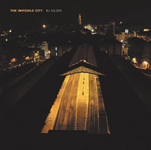|
|
 |
Dusted Reviews
Artist: BJ Nilsen Album: The Invisible City Label: Touch Review date: Feb. 4, 2010 |

|
|
|
 |
In BJ Nilsen’s carefully balanced combinations of natural, performed, and manipulated sounds, nature often seems to have the upper hand. But not on The Invisible City. Its naturally sourced elements, which he’s scrupulously noted track by track, have been digitally processed into subtly humorous grotesques; the bumblebees on “Phase and Amplitude” have been processed into something more akin to a field recording of trucks rumbling in and out a distant construction site, and “Scientia’s” birdsongs has been transformed into pitilessly piercing lances of feedback.
But the humans don’t fare much better. The heroically wailing electric guitar on “Virtual Resistance” gets buried under unidentifiable electronic blasts, bringing to mind images of puny mankind being smudged out by contemptuous Aeolian blasts. And that’s about as evident as people get in this city; it may be the work of mankind, but individual people have been wiped away, perhaps just moments before the listener’s arrival. A weather broadcast flickers into hearing for a moment, and then disappears. An identifiable instrument heaves into the foreground only to be electronically blanched, twisted, and crumpled into something no longer recognizable. The cover images are studies of sparsely lit buildings and empty streets with nary a person in sight. This is the city as experienced by a solitary visitor whose circadian rhythms are set to a different clock. The emptiness is frightening, the occasional surges of activity even more so.
Late in the journey the album detours into recognizable music. With its swelling guitar noise and organ chords, “Gradient” feels a distant kin to Popol Vuh’s soundtracks for Werner Herzog’s movies, which so often accompanied visual meditations of places that man couldn’t reach or hold. It’s a calming gesture, one that is whipped away by the title track’s final blinding flash of sped-up tape. Nilsen has been working in this vein for a decade, but on The Invisible City he’s really upped his game. This is his most emotionally affecting work to date.
By Bill Meyer
|







